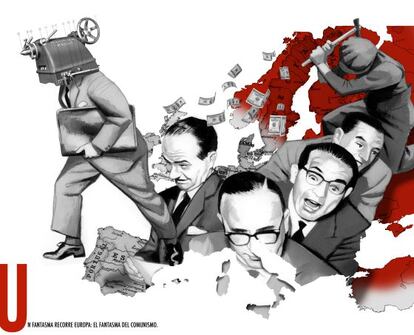'Communist Manifesto' a hit in Madrid
Seminal work snapped up by those seeking an alternative to capitalism


One of the surprise bestsellers at the Madrid Book Fair, a major literary event currently underway in the capital has been a beautifully illustrated edition of the Communist Manifesto.
Published by a small outfit called Nórdica and illustrated by Fernando Vicente, the seminal work by Karl Marx and Friedrich Engels appears to be thriving in the current crisis, as though readers not only wanted to understand what is going on in the world, but also to find out whether there are any alternatives out there.
The numerous inflammatory booklets of the "Time for Outrage" type seemed to have filled that void with their explanations of why governments addressed the crisis by unanimously implementing programs championed by conservative parties during boom times. But what Marx and Engels propose is a complete overhaul of the capitalist system, and it could well be that behind the unexpected success of the Communist Manifesto there lies a desire to see which parts of it might still be relevant and bring some hope to nations that have lost it almost completely.
The second congress of the Communist League, held in London in November 1847, tasked Marx and Engels with an action program, which they submitted for print in February of the following year. Multiple editions and translations followed at a dizzying pace, including a singular version in Russian drafted by Bakunin in 1860. The authors congratulated themselves with every new foreword that they wrote, and there were many.
Beginning in 1883, after Marx's death, it was Engels' wish to have the cover of the Manifesto recognize that the work belonged to his departed colleague, because it was his "exclusive" intuition that all of history is a history of class struggle — of a struggle between the exploiting and the exploited classes. Beyond the personal tribute to his friend, Engels was also trying to say that the Manifesto should be viewed as a historical document rather than a political program. If, in 1872, the authors were talking about the need to make corrections, a decade later Engels was essentially suggesting that he did not feel legitimized to introduce them all by himself.
Its condition as a historical document from 1883 onwards makes the Manifesto inefficient as a political program, yet it conveys a timelessness that is a necessary attribute for success. Based on this intuition that Engels admitted was "solely and exclusively" Marx's, the founders of scientific socialism drew up a giant theory in which the eternal role of the exploiter is played by the character of the bourgeoisie, while the exploited are played by the proletariat.
The Manifesto thus explores, in an exceptionally well-crafted tale, an ancestral face-off that occasionally harks back to the Gilgamesh and Enkidu of Babylon or the biblical angels and their swords of fire. The literary wonders inside the Manifesto are as abundant as in the best epic poems of old, as when Marx and Engels describe communism as a specter that is haunting Europe, or the cruelty of labor relations as the "icy water of egotistical calculation."
Just like other works that time has turned into classics, how close and yet how far successive generations of readers find themselves from the Manifesto.
Tu suscripción se está usando en otro dispositivo
¿Quieres añadir otro usuario a tu suscripción?
Si continúas leyendo en este dispositivo, no se podrá leer en el otro.
FlechaTu suscripción se está usando en otro dispositivo y solo puedes acceder a EL PAÍS desde un dispositivo a la vez.
Si quieres compartir tu cuenta, cambia tu suscripción a la modalidad Premium, así podrás añadir otro usuario. Cada uno accederá con su propia cuenta de email, lo que os permitirá personalizar vuestra experiencia en EL PAÍS.
¿Tienes una suscripción de empresa? Accede aquí para contratar más cuentas.
En el caso de no saber quién está usando tu cuenta, te recomendamos cambiar tu contraseña aquí.
Si decides continuar compartiendo tu cuenta, este mensaje se mostrará en tu dispositivo y en el de la otra persona que está usando tu cuenta de forma indefinida, afectando a tu experiencia de lectura. Puedes consultar aquí los términos y condiciones de la suscripción digital.








































